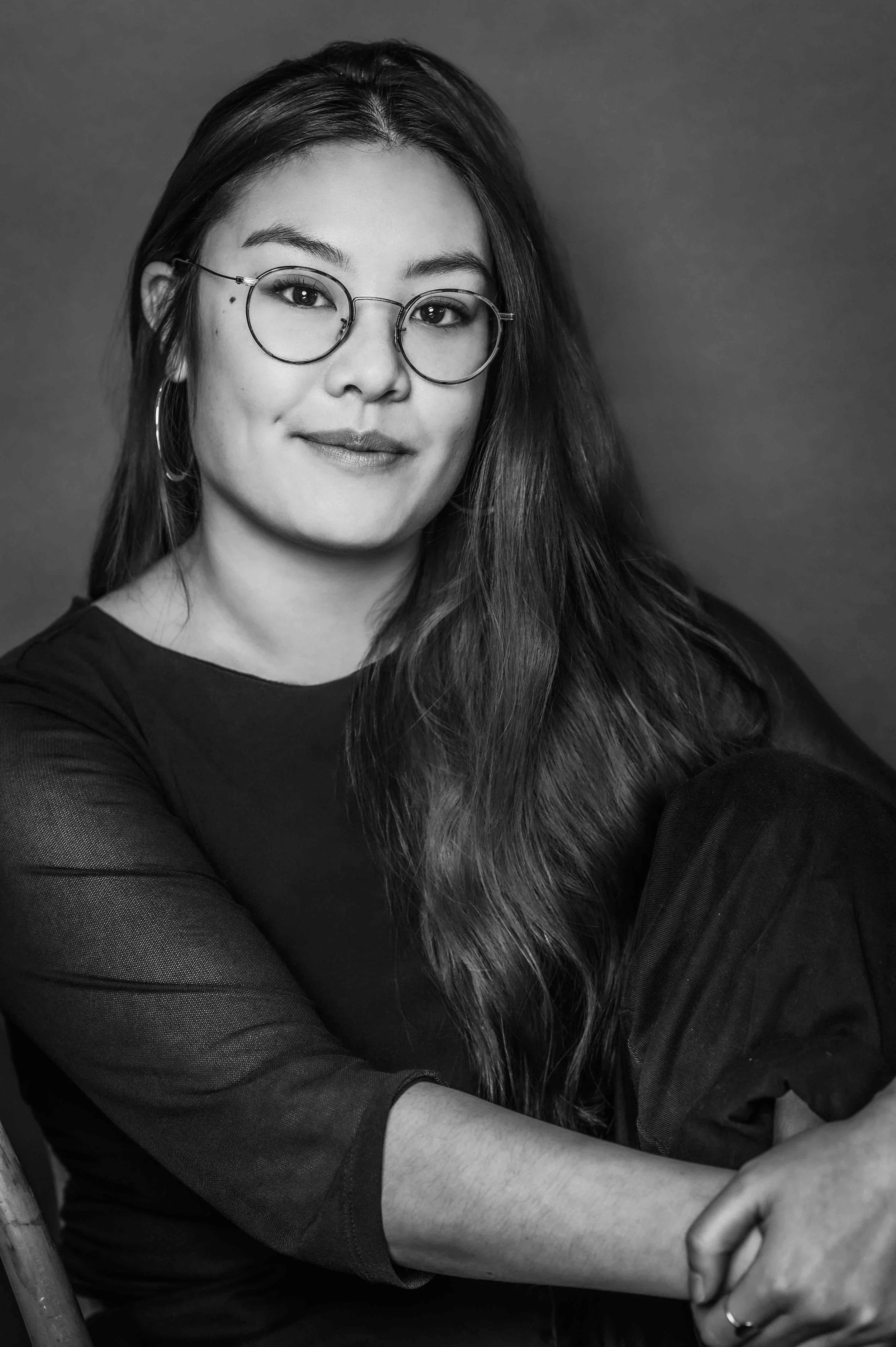In Dance Nation, adult actors channel a troupe of preteen competitive dancers
Clare Barron’s Pulitzer Prize–nominated production traces themes of friendship and jealousy as young athletes train for a national title
(From left) Dance Nation’s Nathan Kay, Amanda Sum, and Rukiya Bernard. Photo by Emily Cooper
The Cultch presents The Search Party’s Dance Nation at the York Theatre from April 23 to May 11 as part of the Warrior Festival
ANYONE FAMILIAR WITH the world of competitive dance knows just how much physical and mental preparation often goes into major performances. Dancers spend hundreds of hours in the studio memorizing and perfecting routines, receiving corrections from teachers, staring at their bodies in the mirror, and battling near-constant self-criticism. Once it’s showtime, all of that is intensified by superficial touches—gluing false eyelashes on, steaming costumes, securing hair into buns with an ungodly number of bobby pins—and then a panel of judges analyzes every move, down to the teeniest flick of a finger.
Suffice to say, it can take a lot out of a person. And playwright Clare Barron, having been through it all herself, acknowledges that in Dance Nation. The theatre production, which was a finalist for the Pulitzer Prize for Drama, follows a troupe of preteen competitive dancers as they prepare for a chance to win a national title in Tampa, Florida. What makes Dance Nation as a whole unique is that even though the characters range in age from 11 to 13, they’re all portrayed by adults in their 20s to early 60s—none of whom are formally trained dancers.
Amanda Sum plays Zuzu, the second-best dancer in the group, while Eileen Barrett plays Maeve, the oldest and least talented of the bunch. When Stir connects with the pair, they’re on a quick break from rehearsals as The Search Party gears up for a run of Dance Nation at the York Theatre as part of The Cultch’s inaugural Warrior Festival.
“She’s really determined,” Sum says of Zuzu, “and has always wanted to be a dancer, but is also grappling with a lot of complexities around feeling what it is to not be the best. But also, her best friend is the best. And to carry through respect and admiration and love for someone you’re so close with, and balance that with the complex feelings of jealousy and self-determination and pressure? I think now, being an adult, those are such big questions to be asking and moving through. And in a 13-year-old body, it’s a lot more difficult to move through those things.”
Eileen Barrett.
Maeve, on the other hand, is what others might call “kind of an odd sock,” according to Barrett.
“I taught a lot of kids theatre classes, and she is one of those kids who’s just really happy to be there,” she adds. “She’s happy to be one of the ensemble, is never going to get out of the corps de ballet if they were in ballet, and is okay with that because these are her friends. So she just really feels, I think, safe and good with these guys, and has grown up with them, but also has a whole bunch of other interests that are odd and weird.”
Barrett’s acting experience spans stage parts in Les Belles-soeurs at Gateway Theatre and Western Gold Theatre’s Escaped Alone; television appearances in shows like The Good Doctor and Supernatural; and film roles in Little Pink House, Hector and the Search for Happiness, and more. Sum, meanwhile, is an interdisciplinary performer who has starred in several editions of Theatre Replacement’s annual East Van Panto and released an EP last year called does it make me naive if i’ve never been part of something where i’ve meant more to them than they did to me?.
Sum also spent several of her elementary- and high-school years as a competitive tap dancer. Performing in Dance Nation, she reveals, has allowed her to reflect on how that time shaped who she is.
“It kind of leans into the idea that 13-year-old problems are just human problems,” Sum says. “I think [Barron] wrote in the production notes, ‘Cuteness is death.’ We don’t have to act like we’re younger than we clearly all are. But these problems that—in our own lives as well—we worked through, moved through, and lived through at 13, they still sit with us into our adulthood. And it just makes you have a lot of space in your heart for these kids who are going through the exact same things that we as adults have socialized and figured out how to work through now.”
Amanda Sum.
While Dance Nation addresses some very vulnerable facets of adolescence, it’s also rife with comedy (and plenty of cringe-worthy moments). The actors are also fully embracing their competitive-dance training—Epsom-salt baths, Tiger Balm, and pain-relief patches have all been musts after long days of rehearsal, according to Sum and Barrett.
Some of the more important lessons in the production revolve around friendship. Namely, say the two actors, it’s key for young people to remember that maintaining relationships on any level can be complex, which is an understanding that can help cultivate empathy within peer groups.
“Each friend is there for you in a different way, or there are things that you can talk to one friend about that you can’t talk to another friend about,” Barrett says. “And that’s something that maybe the characters don’t know yet. You can’t be all things to all people.”
“And in the sense of a team,” Sum expands, “even if we all have the same goal, we have our different ways to work to get to that goal. And that can sometimes be really hurtful to other people, and sometimes that can really champion other people. But even though we’re a team working towards the same thing, everyone has a different way of getting there.” ![]()


























